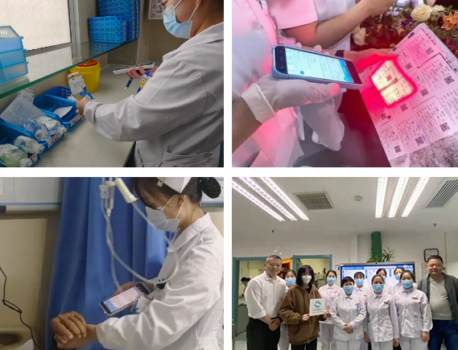The construction of modern hospitals is rapidly advancing, from the simple use of sensors and RFID technology to today’s high-level smart hospitals, where information technology plays a crucial role. This article will delve into several important concepts in hospital construction, including smart hospitals, informatized hospitals, digitized hospitals, green hospitals, and intelligent hospitals, clarifying their differences and connections while focusing on the application of PDAs in this evolution.
- Smart Hospitals
Concept: Smart hospitals emphasize the use of advanced artificial intelligence technology to achieve intelligent management of medical equipment, systems, and processes. This includes utilizing big data, machine learning, and automation technology to enhance the accuracy and efficiency of medical decisions.
Features: Smart hospitals focus on introducing intelligent algorithms to provide more intelligent and personalized medical services through the analysis and learning of medical data. PDAs play a key role in smart hospitals, for example, in patient monitoring, data collection, and intelligent decision support.
PDA Application Example: Healthcare professionals can use PDA devices to instantly access patients’ vital sign data, prescription information, etc. They can also utilize smart applications on PDAs for data analysis, providing faster and more accurate diagnosis and treatment recommendations.
- Informatized Hospitals
Concept: Informatized hospitals emphasize the construction of medical information systems, including electronic medical records, hospital management systems, and remote healthcare. Informatized hospitals integrate and manage medical information through digital means, improving information sharing and circulation.
Features: Informatized hospitals focus on digital medical information management, allowing medical staff to easily access, transmit, and analyze patient information. PDAs in informatized hospitals can serve as mobile terminals, supporting healthcare professionals in accessing patient information anytime, anywhere.
PDA Application Example: Doctors use PDA devices to measure patients’ temperature, view electronic medical records, prescribe electronic prescriptions, and nurses use PDAs to record patient care information, achieving real-time updates and interconnectivity of information.
- Digitized Hospitals
Concept: Digitized hospitals refer to the digitization of traditional paper medical records and processes, achieving comprehensive electronic operation of hospital business. Digitized hospitals include digital medical records, digital medical imaging, etc.
Features: Digitized hospitals focus on replacing traditional paper documents with digital forms to improve the efficiency of data storage, transmission, and management. PDAs in digitized hospitals can be used for the collection, storage, and transmission of patient information.
PDA Application Example: Healthcare professionals use PDA devices to capture and upload patients’ medical images, digitally stored in the medical information system, facilitating real-time access and sharing.
- Green Hospitals
Concept: Green hospitals focus on the sustainability and eco-friendliness of the medical environment. This includes rational resource utilization, waste reduction, energy conservation, etc.
Features: Green hospitals aim to reduce the environmental impact of medical institutions through energy-saving, green building, and sustainable operation, providing healthier and more sustainable healthcare services. The low energy consumption and sustainability features of PDAs align with the principles of green hospitals.
PDA Application Example: Using low-energy PDA devices to replace traditional paper forms, reducing paper usage, aligning with the sustainable development requirements of green hospitals.
- Intelligent Hospitals
Concept: Intelligent hospitals are a comprehensive concept that integrates information technology, intelligent technology, digitization, and green principles, forming a highly intelligent, digitized, and sustainable medical system.
Features: Intelligent hospitals combine the characteristics of smart, informatized, digitized, and green hospitals, aiming to provide more efficient, intelligent, and environmentally friendly medical services. PDAs, as intelligent mobile terminals, support various functions in intelligent hospitals.
PDA Application Example: Healthcare professionals use PDA devices for intelligent rounds, smart monitoring, real-time patient data retrieval, and seamless integration with medical information systems, providing intelligent medical services.
Differences and Connections
These concepts intersect and blend in practice, collectively building a modern healthcare system. An intelligent hospital can be a comprehensive combination of informatized, digitized, smart, and green features, with PDA serving as an intelligent terminal, providing technical support for the digitization and intelligence of healthcare services. From simple sensor applications to highly intelligent hospital construction, PDA has been a valuable assistant in this evolutionary process, injecting new vitality into the development of the healthcare industry. This also leads us to look forward to the future, where medical technology will continue to drive innovation in medical services, providing patients with more comprehensive, efficient, and humane healthcare experiences.


